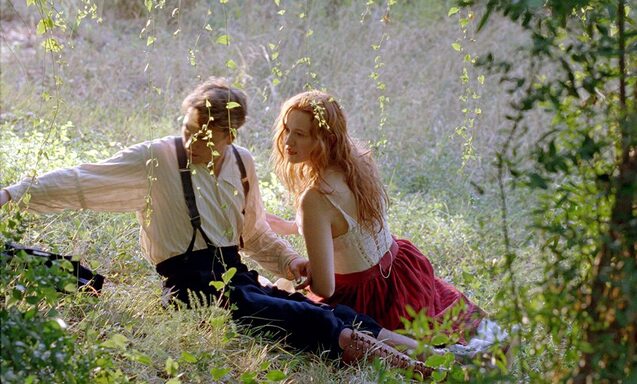RENOIR
**
Director: Gilles Bourdos
Screenwriters: Gilles Bourdos and Jérôme Tonnerre, in collaboration with Michel Spinosa) -based on the work, Le Tableaux Amoureux by Jacques Renoir
Principal cast:
Michel Bouquet
Christa Théret
Vincent Rottiers
Thomas Doret
Romane Bohringer
Michèle Gleizer
Country: France
Classification: M
Runtime: 111 mins.
Australian release date: 24 October 2013
Renoir, directed by Gilles Bourdos and set on the French Riviera during WWII, in the summer of 1915, is an exquisite cinematic experience, but the experience stops at the film’s beauty. We spend 111 minutes in a gorgeous French country villa, surrounded by the most beautiful garden, in an atmosphere that could be described as paradise. It is hard to imagine that, not too far away, men were being slaughtered in the trenches to provide the freedom being enjoyed by the venerable French artist, Pierre-Auguste Renoir (Michel Bouquet). The maestro believed that there was already enough ugliness in the world and therefore refused to contribute to the war, so he was opposed to his son joining the effort.
Renoir is crippled with arthritis and is looked after by a bevy of maids who attend to his every whim. Apart from painting gorgeous landscapes, Renoir also uses the services of life models, with whom it was suggested he had affairs. In this case, a young girl Andrée (Christa Théret), Renoir’s muse, ends up having a long-term relationship with his son Jean (Vincent Rottiers, who Australian audiences will recognise from the recently released Mood Indigo). Jean, of course, went on to become the famous film director responsible for classics such as The Grand Illusion (La Grande Illusion- 1937), and The Rules of the Game (La Règle du Jeu - 1939), but this takes place long before that happened. Here he is back from the war, recuperating from a wound to his leg. The only reference to the carnage of war is depicted in shots of rabbit carcasses dripping in the kitchen and the rows of disfigured men returning from battle along the country lanes. Otherwise, the screen is filled with the golden light and the muted colours of the garden.
Renoir is a film that has no great dramatic storyline and, on that level, appears rather shallow. The characters don’t develop much either, although the performances, without exception, are very good and manage to sustain the mood of the film. It is so breathtakingly beautiful that it is like an Impressionist painting slowly unfolding before your eyes, evoking the period of art it represents. The glorious cinematography by Taiwanese DOP, Mark Ping Bin Lee, is much enhanced by an equally glorious score by the award-winning Alexandre Desplat. Renoir is France’s official submission for the Best Foreign Language Film at the 2014 Oscars. It will be interesting to see how it fares in a category that is often full of tough films with ‘worthy’ scripts. Maybe Renoir’s thoughts about beauty will out vote the ugliness in the world after all.
Screenwriters: Gilles Bourdos and Jérôme Tonnerre, in collaboration with Michel Spinosa) -based on the work, Le Tableaux Amoureux by Jacques Renoir
Principal cast:
Michel Bouquet
Christa Théret
Vincent Rottiers
Thomas Doret
Romane Bohringer
Michèle Gleizer
Country: France
Classification: M
Runtime: 111 mins.
Australian release date: 24 October 2013
Renoir, directed by Gilles Bourdos and set on the French Riviera during WWII, in the summer of 1915, is an exquisite cinematic experience, but the experience stops at the film’s beauty. We spend 111 minutes in a gorgeous French country villa, surrounded by the most beautiful garden, in an atmosphere that could be described as paradise. It is hard to imagine that, not too far away, men were being slaughtered in the trenches to provide the freedom being enjoyed by the venerable French artist, Pierre-Auguste Renoir (Michel Bouquet). The maestro believed that there was already enough ugliness in the world and therefore refused to contribute to the war, so he was opposed to his son joining the effort.
Renoir is crippled with arthritis and is looked after by a bevy of maids who attend to his every whim. Apart from painting gorgeous landscapes, Renoir also uses the services of life models, with whom it was suggested he had affairs. In this case, a young girl Andrée (Christa Théret), Renoir’s muse, ends up having a long-term relationship with his son Jean (Vincent Rottiers, who Australian audiences will recognise from the recently released Mood Indigo). Jean, of course, went on to become the famous film director responsible for classics such as The Grand Illusion (La Grande Illusion- 1937), and The Rules of the Game (La Règle du Jeu - 1939), but this takes place long before that happened. Here he is back from the war, recuperating from a wound to his leg. The only reference to the carnage of war is depicted in shots of rabbit carcasses dripping in the kitchen and the rows of disfigured men returning from battle along the country lanes. Otherwise, the screen is filled with the golden light and the muted colours of the garden.
Renoir is a film that has no great dramatic storyline and, on that level, appears rather shallow. The characters don’t develop much either, although the performances, without exception, are very good and manage to sustain the mood of the film. It is so breathtakingly beautiful that it is like an Impressionist painting slowly unfolding before your eyes, evoking the period of art it represents. The glorious cinematography by Taiwanese DOP, Mark Ping Bin Lee, is much enhanced by an equally glorious score by the award-winning Alexandre Desplat. Renoir is France’s official submission for the Best Foreign Language Film at the 2014 Oscars. It will be interesting to see how it fares in a category that is often full of tough films with ‘worthy’ scripts. Maybe Renoir’s thoughts about beauty will out vote the ugliness in the world after all.
